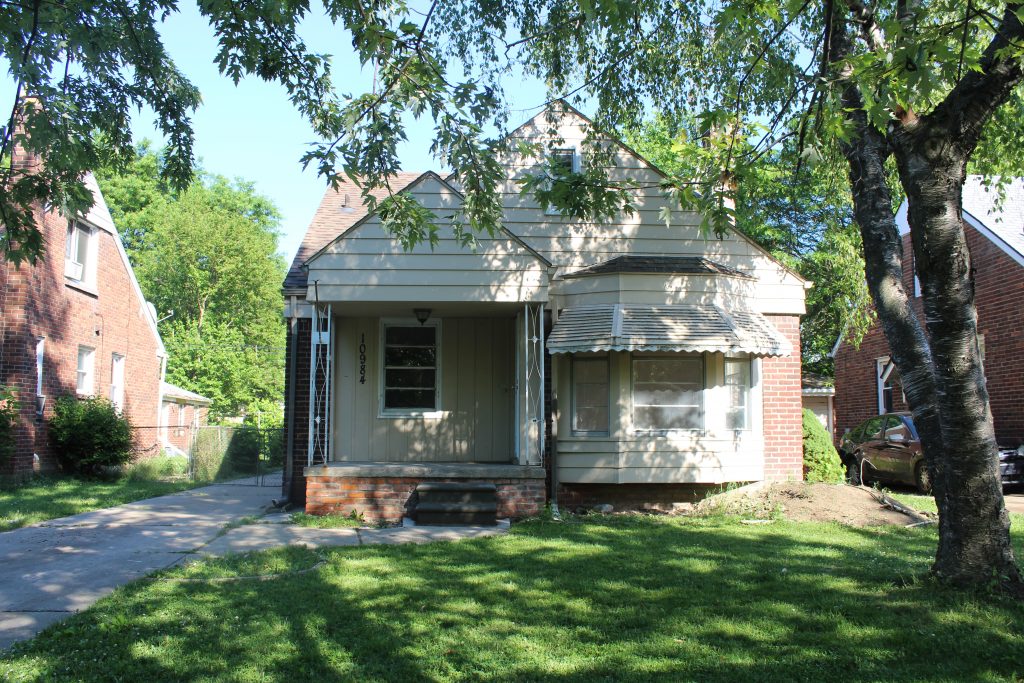Detroit’s Hot Real Estate Market Is Tough for First-Time Homebuyers
While some are holding out hope, others are getting creative or giving up.


Detroiter Cidney Allen’s dream home is somewhat modest.
“It’s just something that has at least three bedrooms, two bathrooms, a basement, an upstairs, and hopefully a garage and a big backyard,” says Allen.
“I’ve been doing this for 42 years and I’ve never seen a market like this before.” –Karen Kage, CEO of Realcomp
You’d think that wouldn’t be too hard to find on the east side of Detroit or nearby suburbs where Allen is looking. “But with this market, it’s like looking for a unicorn,” says Allen.
After house hunting for three months she’s made multiple offers, but none of them have resulted in her buying a home.
“It’s been frustrating, especially with the way the market is going right now because it’s so crazy,” says Allen. “There’ll be houses that are listed and by the time we try to schedule to see them they’re like, ‘Nope, someone already made an offer.'”
The real estate market is hot across the country right now, and Detroit is no exception.
Listen: Challenges facing first-time homebuyers in Detroit.
A Seller’s Market
“I’ve been doing this for 42 years and I’ve never seen a market like this before,” says Karen Kage, the CEO of Realcomp, the largest real estate listing service in Michigan.
Right now housing inventory is low and demand is extremely high.
In April, the average house in metro Detroit was only on the market 30 days before becoming a pending sale. That’s the lowest it’s been for 18 years. It’s an extremely competitive market for buyers. Only the ones with the most experience and money are closing on houses. That’s usually people who’ve previously owned homes or are investors.
Perrin Emanuel, a Realtor with Reach Realty Group in Redford Township, says about half of his sales have been going to investors.
“When you got people calling from New York and Boston and California and they find out they can buy a house here in Detroit, a single-family house or even a multifamily unit, under $50,000, they can’t believe that,” says Emanuel.
The National Association of Realtors reports the median sales price across the country in April was $341,600. In the City of Detroit, Realcomp says it was $75,000. That means homes in Detroit are relatively affordable, but they’re still out of reach for many shoppers. Sales are going to people who can put in a cash offer, or who are able to offer over the asking price and make up the difference in cash. “Sellers will take a cash buyer first, then somebody who has been preapproved for a conventional mortgage, and lastly, an FHA buyer,” says Emanuel.
How Detroit Homes Are Purchased
FHA loans are Federal Housing Administration loans. They’re insured by the government for people with lower incomes or lower credit scores who can’t quite qualify for conventional mortgages. Many first-time buyers in Detroit are only able to qualify for FHA loans. But shopping with an FHA mortgage makes house hunting more complicated because houses need to pass a safety inspection, which means properties need to be in good shape and most aren’t in Detroit. If there are issues, the seller usually has to make repairs before the sale can go through. That’s why some sellers are choosing to avoid FHA loans altogether right now.
“I mean, I get it,” says Bre’Anna Tinsley, a Realtor Partner at Thrive Realty Co and former WDET reporter. “Sellers can put their houses on the market and they can be sold for cash with thousands and thousands of dollars over the asking price. People are waiving inspections, people are doing appraisal guarantees where basically they’re saying whatever this house appraises at we’ll pay over that amount with x amount of dollars. And so sellers don’t even have to worry about FHA or trying to do that extra step.”
But Tinsley says she wishes more sellers would consider buyers with FHA loans. “Just because their credit might be a little bit lower doesn’t mean they don’t have the cash on hand in order to do whatever needs to be done in order to purchase the home,” says Tinsley.
Desperate Times Call for Creative Measures
Detroiter Margo Dalal says she and her partner began shopping for a home in early 2020 with an FHA loan as well as a loan from the Neighborhood Assistance Corporation of America or NACA. It’s similar to FHA in that it requires houses to be up to code before a sale can go through. Dalal says they put in about seven offers and none were accepted.
“It was so stressful. We looked at hundreds of homes. I saw my real estate agent more often than I probably saw anyone else besides my partner this year,” Dalal says.
At one point, she and her partner bid $119,000 for a 1,000-square-foot, two-bedroom home in Detroit with a kitchen that needed to be completely renovated.
“I like to joke we went the millennial route of co-ownership.” –Margo Dalal, homebuyer
“I can’t believe, looking back, some of the offers that I made on houses. They just felt like crazy amounts of money for what we were getting,” says Dalal. “We were, I don’t want to say we were desperate, but we were really, really wanting it to happen.”
Finally Dalal and her partner found a house, but it wasn’t on Zillow or Trulia or any of the other apps. A friend of theirs who lives alone asked if they wanted to buy into his house, and all live together. Dalal and her partner said yes.
“I like to joke we went the millennial route of co-ownership,” she says. “It’ll lower everyone’s monthly costs, everyone can pitch in on maintaining the home. It’s gonna work out for us. So we’re happy with our decision.”
Most homeowners, however, aren’t going to be happy until they’re able to buy a place for themselves. That’s why some of them are deciding to wait it out until the market becomes more favorable to buyers.
Trusted, accurate, up-to-date
WDET is here to keep you informed on essential information, news and resources related to COVID-19.
This is a stressful, insecure time for many. So it’s more important than ever for you, our listeners and readers, who are able to donate to keep supporting WDET’s mission. Please make a gift today.
